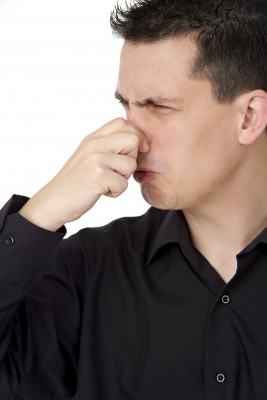
Bad breath (or halitosis) may be subjective in that a person may be bothered by his or her breath but it may not be noticed by others. The objective type of halitosis is a condition where people around that person notice the bad breath while the person involved may or may not notice it.
Don’t despair! There are methods to address an embarrassing bad breath problem but first, it is important to pin point the source of the problem. Some of the causes could be benign while others could be serious.
Causes of Bad Breath
Understanding the causes of halitosis is the first step towards solving the problem.
There are several possible causes of bad breath. While the subjective condition of bad breath is commonly caused by localized dental problems, such as infection, ill-fitting dental fillings or dentures, there are more factors that cause objective type of bad breath, such as;
- Periodontal or gum disease;
- Consumption of certain foods, e.g., garlic
- Poor oral hygiene – caused by food particles between the teeth, on the tongue and around the gums which collect bacteria;
- Dry mouth condition (xerostomia) which can occur due to hormonal changes (e.g., menopause) or due to other medications;
- Smoking;
- Other medical conditions, such as digestive system problems, diabetes, ear or nose infections, or some forms of cancer
Minimize the problem
Practicing good oral hygiene such as brushing your teeth at least twice a day, making sure the gum and tongue areas are cleaned, as well as flossing your teeth are the most effective way to self-treat or minimize bad breath. Using non-alcohol based mouthwash may also be helpful.
Regular visits to the dentist, i.e. at least twice a year, are important to ensure that any potential problems are detected early and treated.
Consider seeing a dentist
Halitosis is not a disease but a clinical symptom indicating that there is something wrong with the mouth or the body.
Bad breath is frequently linked to periodontal (gum) disease, which in the long term, can damage gums, bones and other structures that support the teeth. You should see a dentist or periodontist (gum specialist) if you have bleeding or swollen gums, or when the bad breath persists despite your best efforts.
If the halitosis is due to gum disease, gum treatment and regular reviews would be recommended.
If the cause is traced to food particles that are trapped in misaligned or crowded teeth, the dentist may recommend seeking orthodontic treatment to straighten the teeth. Impacted wisdom teeth that have not enough room to erupt can also be food traps and one may want to consider wisdom teeth removal as a preventive measure.
If bad breath is due to certain medical conditions, your dentist will refer you to the appropriate medical specialist.
With a proper examination, investigation and diagnosis, your dentist should be able to pin point the causes of bad breath and carry out treatment accordingly.





